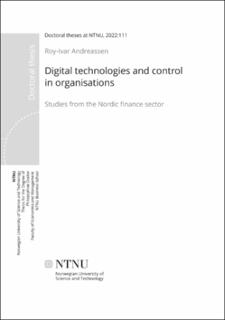| dc.contributor.advisor | Bjørnenak, Trond | |
| dc.contributor.advisor | Nyland, Kari | |
| dc.contributor.author | Andreassen, Roy-Ivar | |
| dc.date.accessioned | 2022-04-21T13:26:59Z | |
| dc.date.available | 2022-04-21T13:26:59Z | |
| dc.date.issued | 2022 | |
| dc.identifier.isbn | 978-82-326-5535-9 | |
| dc.identifier.issn | 2703-8084 | |
| dc.identifier.uri | https://hdl.handle.net/11250/2992075 | |
| dc.description.abstract | Sammendrag
I de siste tiårene har bruken av digitale teknologier lagt til rette for endringer i forretningsprosesser og organisering av arbeid. Økningen i bruk av digitale teknologier har blitt spådd å påvirke hvordan ledere utøver kontroll, og hvordan beslutninger fattes i organisasjoner. Fremveksten i bruk av stordata og maskinlæring har inspirert diskusjoner om hvordan organisasjoner utøver kontroll, og spekulasjoner om fremtiden til de som jobber i regnskaps-og controllerstillinger. Denne avhandlingen bidrar til debatten gjennom empirisk undersøkelse av hvordan digitale teknologier er involvert når ledere konfigurerer styringsverktøy og styringspraksiser.
Avhandlingen bygger på et fortolkende perspektiv, og det empiriske grunnlaget er to casestudier fra den teknologitunge finanssektoren; ett fra et forsikringsselskap og ett fra en regional sparebank. Avhandlingen utforsker hvordan digitale teknologier legger til rette for endringer i controllerrollen, maktstrukturer og konfigurasjonen av styringsverktøy.
Analysene illustrerer hvordan den utvidede organisasjonskonteksten er viktig i utformingen og bruken av digitale teknologier og styringsverktøy. I den første artikkelen viser jeg hvordan digitale teknologier kan bidra til endringer i rollene og ansvarsområdet til controllere. Analysene i den andre artikkelen illustrerer hvordan digitale teknologier kan legge til rette for sentralisering av makt, og at det er et samspill mellom digitale teknologier og maktstrukturer i organisasjoner. Den tredje artikkelen argumenterer for at kollektive verdier og oppfattelser i en organisasjon former bruken av digitale teknologier og styringsverktøy i deres daglige praksis.
Sammenfattet viser de empiriske analysene at digitale teknologier helt grunnleggende bidrar til endring i hvordan organisasjoner fører oversikt over hendelser. Som en følge av nye oversikter over hendelser, «nye data», muliggjør de digitale teknologiene endringer i virksomhetens styringsverktøy. Dette er endringer som ofte er forventet når en organisasjon velger å digitalisere. Hovedfunn i min avhandling er imidlertid at dette potensialet for endring i styringsverktøy håndteres forskjellig i de to ulike casene jeg har studert. Konklusjonen er dermed at organisatorisk og sosial kontekst påvirker utformingen og bruken av digitale teknologier og styringsverktøy. Den samme digitale løsningen kan ha vidt forskjellige konsekvenser for ledelse, styring og kontroll, avhengig av organisatorisk kontekst. | en_US |
| dc.description.abstract | Summary
Digital technologies have facilitated changes in business processes and work organising over the last decades. The expanding use of digital technologies has been predicted to influence how managers exercise control, and how decisions are made in organisations. The advent of big data and machine learning have sparked discussions on how organizations manage control, and even of the future of the accounting profession. Through a detailed exploration of how digital technologies influence managers configurations of controls and their control practices in day to day management, this thesis contributes to the debate by empirical investigation.
In its design the thesis takes an interpretive position, and builds on two case studies, to investigate how digital technologies facilitate changes in management accountants’ roles, power structures and the configuration of management controls. The cases; one insurance company and one regional savings bank, are selected from the digitally advanced financial service industry.
The analysis of the two selected cases illustrates how the particular organisational context of an organisation contributes to shape the design and use of both digital technologies and management controls. The first article finds that the digital technologies can contribute to changes in the roles and jurisdiction of management accountants. The second paper finds that digital technologies can facilitate centralisation of power, and that there is an interplay between digital technologies and organisational power structures. The third paper argues that collectively shared beliefs and values shape the design of both digital technologies and management controls.
Synthesizing the findings from the studies I argue that digital technologies contribute to changes in how organisations keep accounts of events. As a consequence, the digital technologies facilitate changes in different forms of management controls. Finally, the studies illuminate how this potential for change is handled different in different organisational and social contexts, allowing me to conclude that context strongly influence the configuration and use of digital technologies and management controls in their daily practice. The same digital technology can lead to different changes, depending on the context of the organisation. | en_US |
| dc.language.iso | eng | en_US |
| dc.publisher | NTNU | en_US |
| dc.relation.ispartofseries | Doctoral theses at NTNU;2022:111 | |
| dc.relation.haspart | Paper 1: Andreassen, Roy-Ivar. Digital technology and changing roles: a management accountant’s dream or nightmare?. Journal of Management Control 2020 | en_US |
| dc.relation.haspart | Paper 2: Andreassen, Roy-Ivar; Bjørnenak, Trond. Digital technologies and centralisation of power: A case study of decision-making and management control. This paper is awaiting publication and is therefore not included. | en_US |
| dc.relation.haspart | Paper 3: Andreassen, Roy-Ivar. Organisational culture and digital technologies: A case study on configurations of management controls | en_US |
| dc.title | Digital technologies and control in organisations: Studies from the Nordic finance sector | en_US |
| dc.type | Doctoral thesis | en_US |
| dc.subject.nsi | VDP::Samfunnsvitenskap: 200::Økonomi: 210 | en_US |

